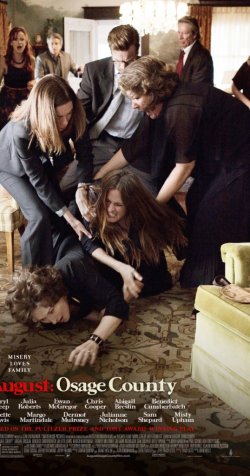My husband and I sat down to watch this movie last Saturday, mainly out of curiosity. It’s not the sort of thing we usually watch, but it was filmed practically in our backyard, and we felt compelled to see exactly what Benedict Cumberbatch in Oklahoma looks like, because when is that ever likely to happen again?
Gotta say, I didn’t care for it. This is partly because I felt like it kind of bashed Oklahoma (and Oklahomans) and perpetuated a lot of unpleasant Okie stereotypes — poor, bitter, cousin-marrying hicks who are racist against Indians and who knows who else (even though the vast majority of “white” people in Oklahoma are part Indian) but at least the playwright (who also wrote the screenplay) is actually from here, so it was criticism from an insider. Fair ‘nuff, I guess.
But mostly it was because this left me feeling the same way most non-musical plays (as well as literary fiction) usually leaves me feeling — depressed and wondering what, exactly, was the point? The whole “story,” if you can call it that, can pretty much be summed up thusly: angry, unpleasant people sit around sniping at each other in various settings for three acts, the end. There’s no real plot, no clearly identifiable protagonist to root for, no clearly identifiable antagonist because everybody is antagonistic to each other. Nobody arcs — nobody learns something about themselves or grows as a character; everybody is exactly the same at the end of the movie as they were at the beginning.
Bleah. I will never understand why so many literary critics slobber all over this sort of thing and disdain so-called “commercial fiction” — both genre and mainstream — that has actual plots and characters that you can care about and root for and actual development of those characters. Especially because doing those things is not easy, and doing those things well is really hard. Do you know what’s easy? Having your characters do nothing but argue for three acts. Bleah.
I do understand why this sort of thing works as a play, though. It’s a great showcase for acting. In this case, it made an excellent fight ring for Meryl Streep and Julia Roberts to try to out act one another (it’s telling that I thought the most natural performance came from the one actress in the film that I’d never heard of before; and before the Sherlock fangirls hurt me, Cumberbatch did a pretty good job, too). Still, it seems to me an even better acting challenge is to portray, y’know, character growth. Otherwise known as that little thing that makes a story an actual story.
